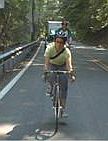 I had the pleasure of attending the "LAB Road I for City Planners, Engineers and Police Officers" course taught by Steve Goodridge and Bruce Rosar a couple weeks ago. Avid Triangle cyclists likely know Steve and Bruce from their active participation on local, regional and world wide cycling advocacy listservs. They are staunchly in the Vehicular Cycling camp and aren't afraid to, on occasion, use emotionally-charged language in making their points. With that previous introduction to their feelings about vehicular cycling and bike-specific facilities, and knowing the intended audience for this course, I was looking forward to seeing the dynamic.
I had the pleasure of attending the "LAB Road I for City Planners, Engineers and Police Officers" course taught by Steve Goodridge and Bruce Rosar a couple weeks ago. Avid Triangle cyclists likely know Steve and Bruce from their active participation on local, regional and world wide cycling advocacy listservs. They are staunchly in the Vehicular Cycling camp and aren't afraid to, on occasion, use emotionally-charged language in making their points. With that previous introduction to their feelings about vehicular cycling and bike-specific facilities, and knowing the intended audience for this course, I was looking forward to seeing the dynamic.It ended up being refreshingly uneventful. Steve and Bruce are are excellent teachers. Both are obviously extremely comfortable with the material, and are also adept at handling student questions, even challenging ones, with a positive, instructive demeanor. There were a couple times, for instance, when they addressed questions posed from a "cyclist inferiority" perspective and provided positive-action answers, explaining how and why cyclists are able (and should feel able) to proceed confidently in all traffic scenarios.
Perhaps the greatest disappointment was the lack of turnout. Personally, I believe that cycling vehicularly is the right way for pedal-powered travellers to navigate traffic. Separated facilities often create intersections that are counter-intuitive to both cyclists and motorists and are, therefore, dangerous. And the "magic white line" bike lanes can give both cyclists and motorists a false sense of security, discouraging active sharing of the road. Govt representatives need to hear Steve and Bruce's messages regarding bicycle accident statistics and how the principles of VC make cycling safer for all vehicles. Getting the message delivered clearly will help municipalities make better decisions about whether to provide bike-specific facilities (almost certainly yes, for better or worse) and how to use real-world statistics and lessons-learned to design those facilities in such a way as to increase the overall road comfort level of cyclists.
I was pleased, though, that of the six participants, the city of Durham was well-represented by its Bicycle-Pedestrian Coordinator, a City Planner and me from the Bike Ped Advisory Commission. Durham has a very active community of cyclists who use their bikes in at least some part for transportation. Hopefully having city reps in this class will ultimately lead to policies that will make Durham not just more bike friendly, but also better designed to support cycling vehicularly.
- Read more about Bicycle Driving at HumanTransport.org and at BicycleDriving.com.
- Read more about Vehicular Cycling on Wikipedia.
- Read more about Effective Cycling on JohnForester.com.
- Join the Durham Bicycle & Pedestrian Yahoo! Group or the RTP Bike/Ped Listserv.
No comments:
Post a Comment